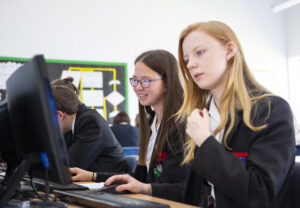A programme of research running the largest-ever set of trials to identify ways to encourage more young women to study Computer Science

At a glance
- A £2.4 million research project, funded by the Department for Education in England as part of the National Centre for Computing Education (NCCE)
- Implemented and evaluated in a collaboration between the Raspberry Pi Foundation; STEM Learning; and BCS, The Chartered Institute for IT (the three organisations which formed the consortium that set up and established the NCCE), and the Behavioural Insights Team; Apps for Good; and WISE
- Exploring the influence of teaching approach, relevance, non-formal learning, belonging, and timetabling and subject choice materials on gender balance in computing
- Run from 2018 to 2022 in hundreds of primary and secondary schools in England
Why this research?
Currently, many young women do not see computing and similar subjects as useful to them. In England, this is evident in a disproportionately low number of young women choosing to study for qualifications in Computer Science at GCSE and A level. In the research literature, we identified many factors that are likely to contribute to this, including a lack of the feeling of belonging in the subject, a lack of encouragement, and fewer opportunities to engage with female role models.
Who was involved?
The Department for Education in England funded this programme of research to better understand some of the factors that could encourage girls to develop and interest in computing, and could increase the numbers of young women who choose to study Computer Science at GCSE and A level.
A range of interventions were trialled in schools, including a number of pilot studies, quasi-experimental trials, and randomised controlled trials (RCTs). The interventions were led by us at the Raspberry Pi Foundation, and implemented by us in collaboration with STEM Learning; BCS, The Chartered Institute for IT; the Behavioural Insights Team; Apps for Good; and WISE.
Interventions
- Teaching approach: Trialing pair programming, peer instruction, and storytelling as approaches to teaching Computing
- Belonging: Encouraging a sense of belonging in the subject, including work with role models and involving parents and guardians
- Non-formal learning: Making the link between non-formal activities and future opportunities in computing
- Relevance: Supporting teachers to bring students’ interest and things they care about into their teaching
- Subject choice and options materials: Exploratory research into potential barriers to choosing to study the subject further
Findings
The findings from this project have now been published. Read our summary of the findings here.
You can also read our analysis and commentary on the results of each study, and the full report from the independent evaluators:
- Storytelling pilot study: Our analysis and commentary
Storytelling pilot: Evaluation report - Pair Programming study: Our analysis and commentary
Pair Programming: Evaluation report - Peer Instruction study: Our analysis and commentary
Peer Instruction: Evaluation report - Belonging study: Our analysis and commentary
Belonging: Evaluation report - Relevance study: Our analysis and commentary
Relevance: Evaluation report - Non-formal learning study: Our analysis and commentary
Non-formal learning (primary school): Evaluation report
Non-formal learning (secondary school): Evaluation report - Subject choice and options evenings: Evaluation report
Find out more
- A review of the literature: Childs, K., (2021). Factors that influence gender balance in computing. Understanding computing education: Volume 1. Seminar proceedings, Raspberry Pi Foundation, April 2021. Available at: https://www.researchgate.net/publication/352368046_Factors_that_impact_gender_balance_in_computing
- A presentation at our online seminar series (recording): Gender balance in computing: What the research says
- A paper and video presentation from the UKICER conference: Leonard, H.C., Quinlan, O., & Sentance, S. (2021). Female pupils’ attitudes to computing in early adolescence. Proceedings of UKICER 2021, 5. https://dl.acm.org/doi/pdf/10.1145/3481282.3481289
